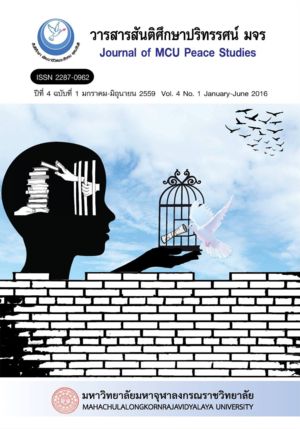A Comparative Study of Mediation Centre of Lawyers Council of Thailand and Buddhist Peaceful Means
Main Article Content
บทคัดย่อ
This research article is of 3 objectives, i.e. 1) to study the way to mediate dispute of Mediation of Lawyers Council; 2) to study the way to mediate disputes according to Buddhist principles; and 3) to compare the mediation of Mediation of Lawyers Council with the mediation according to Buddhist principles.
From the study, it is found the followings:
1) The Mediation Centre of the Lawyers Council of Thailand having a discipline control among the lawyers as dispute mediators by their ethics consists of the following : performing duties without taking side; having no bias towards any side; equally giving justice to the disputing parties; keeping factual information yielded from the mediation as a secret; accepting being the mediator of any dispute case, the mediator cannot act as a lawyer or an arbitrator for the dispute parties; giving advice in views of advantages and disadvantages to the dispute parties; and behaving according to lawyer-ethics.
2) The mediation according to Buddhist principles: Buddhist peaceful means is available for using in the process of mediation consisting of loving kindness to each other, lessening bias towards each other, forgiving each other, and having right speech to each other. For the qualification of the mediators in accordance with Buddhist peaceful means, it is the principle of Kalyāṇamitta-dhamma: qualities of a good friend.
3) From the outcome of the comparison between the Mediation Centre of the Lawyers Council and the Mediation according to Buddhist principles, it is found that there is conformity both in the content and the way of practices; the regulation of not allowing the lawyer, whose case has already been accepted as its mediator, to act as any dispute party’s lawyer or arbitrator, giving equal justice to both sides of dispute parties, and performing duties without inequality and bias to any side are in harmony with Buddhist peaceful means in the principles of loving kindness and lessening bias towards one another; while keeping collective facts, giving advice relating to advantages and disadvantages to both dispute parties, and behaving in frames of lawyer-ethics and manner are in line with principles of the right speech and Kalyānฺamitta-dhamma: qualities of a good friend.
Article Details
ทัศนะและความคิดเห็นที่ปรากฏในบทความในวารสาร ถือเป็นความรับผิดชอบของผู้เขียนบทความนั้น และไม่ถือเป็นทัศนะและความรับผิดชอบของกองบรรณาธิการ ยินยอมว่าบทความเป็นลิขสิทธิ์ของวารสาร


